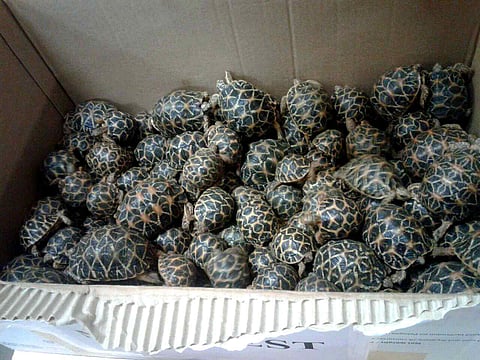

Customs officials at the Chennai airport caught two men trying to smuggle nearly 210 baby star tortoises, stuffed in boxes of chocolate, to Bangkok on Monday.
Star tortoises are protected under Schedule IV of the Indian Wildlife (Protection) Act, 1972.
The two men – a 26-year-old and a 23-year-old – were apparently given the boxes by someone else, who promised them a reward of Rs 10,000 to deliver them to Bangkok, a forest official told TNM. They denied having any knowledge of what the boxes contained – they believed they were filled with chocolates. They were let off after being fined Rs 25,000 each.
The star tortoises, all of which were between four and five months of age, were handed over to the Forest Department and have now been released into the Guindy National Park.
This is not the first such incident to occur.
Earlier in August, over 2,500 star tortoises, valued at about Rs 25 lakh, were seized from a house in Avadi. The bust was courtesy a tip-off, which alerted the Directorate of Revenue Intelligence (DRI) about the tortoises being procured from various parts of the country to be smuggled out of India. In a joint operation with the Tamil Nadu Forest Department, the DRI had arrested one person in connection to the case, even as his accomplices managed to escape.
The Indian star tortoise is the most-traded species of tortoise globally, reports Janaki Lenin for The Wire. They are smuggled in huge numbers and are mostly confiscated from airports. And according to numbers from the Wildlife Protection Society of India, while almost 8,000 star tortoises were rescued between 1990 and 1999, the number shot up to 36,000 between 2000 and 2013, nd a majority of them are seized from Tamil Nadu.
But why are they smuggled in the first place?
A star tortoise is not smuggled for eating, unlike soft-shelled tortoises. However, it is now one of the most expensive reptile pets in the international pet market, Chief Conservator of Forests, Shekhar Kumar Niraj told P Oppili of TOI.
Oppili also reported that these tortoises are natives of “scrub jungles across the southern peninsula from Warangal (in Telangana) to Chikmagalur (in Karnataka)” and also inhabit areas with similar vegetation such as Chittoor in Andhra Pradesh, Ramanathapuram, Tuticorin, Sivaganga, Srivilliputhur and Villupuram (Tamil Nadu).
In addition to the southern states, the star tortoises are also found in Gujarat and Rajasthan, as well in the eastern state of Odisha. There are slight variations in these populations by region, such as variations in shell patterns.
But it is the south Indian tortoise which is the most in demand, and hence, most smuggled. Chennai is a trade hub of sorts for the species and these reptiles are smuggled to a number of countries in Asia, like Malaysia, Singapore, Bangladesh and Sri Lanka, as well as to European and America.
Experts have said that there is a lack of awareness about the smuggling and the subsequent endangering of the species. There is also a gap in research about how mass smuggling and trade are affecting the tortoises’ population in the wild. Experts also suggest that elevating star tortoises from Schedule IV of the Indian Wildlife (Protection) Act to Schedule I may act as a deterrent and enable better protection.